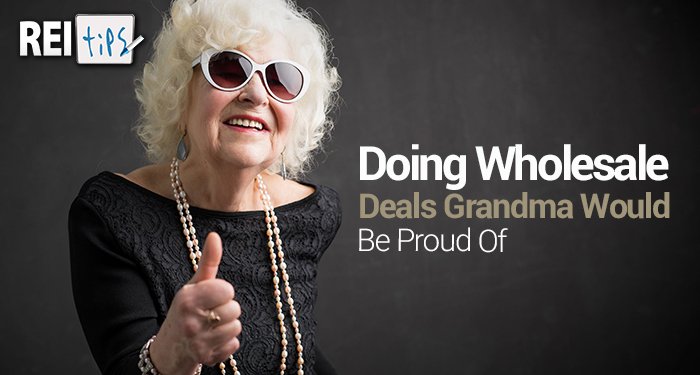But how does wholesaling work, really? And how do you do a deal that even Maria would proudly teach her Von Trapp kiddos as the do-re-mi of investing?
Let’s start at the beginning.
What Is Wholesaling?
A wholesaler is like a matchmaker. For a fee, they connect great real estate deals with eager investors.
Sounds easy, right?
Here’s an example…
Whitney Wholesaler puts bandit signs all around her farm area, telling everyone who reads them that she buys houses. Harry Homeowner calls Whitney and tells her he really wants to sell; he’s been getting foreclosure notices.
Now what?
Here’s where different people will tell you different things. Let’s continue with just one scenario for now…
Whitney checks comps, meets with Harry, and tells him she wants to make a deal for $55,000. She writes up a purchase agreement, stating that she (or someone she assigns the agreement to) will buy the property for $55,000 within 30 days.
Whew! Whitney’s got a great deal. Now all she needs is to make a match with a cash buyer. She’s got a list of buyers, so no problem. Barry Buyer answers Whitney’s call and says he thinks this is a great property for him. He’s definitely willing to buy it for $62,000.
Woohoo! Now Whitney’s made a match. She writes up an assignment contract that gives Barry the right to purchase the property. Barry can’t wait to flip that property.
Then the title company comes in and processes all that paperwork, and Whitney Wholesaler gets a check for $7,000.
What a day for Whitney the Matchmaker.
But Wait…
At this point you might have some questions:
1. What if Whitney can’t find a buyer?
2. What’s all the hype about this scenario? I’ve heard wholesaling is illegal.
3. Well this sounds amazing. How can I make $7,000 in one deal?
Let’s start with the “what ifs.”
No Risky Business
When you do a deal, of course you want it to be one that’s going to make you money and isn’t putting you at risk in any way.
So what if you do a deal like Whitney’s… but you can’t find a cash buyer? Are you stuck with the deal?
If you sign a purchase agreement, then yes, you’ve agreed to purchase the property.
This sounds risky. But it doesn’t have to be, for a couple of reasons.
1. Buyers Wanna Buy
If you’ve got a solid list of cash buyers (or one or two really reliable buyers) and you know what they like, you can be pretty confident that they will want the deal you’re offering.
Not sure? Show them the property. You want to be careful that they don’t cut their matchmaker out of the deal here, so you can give them the relevant property information (condition of the house, bed/bath count, square footage, neighborhood) and the amount they would pay without giving them the property address.
Do this before you sign an agreement with the seller. If your cash buyer is really interested, get everything settled with the seller, and then set up your assignment contract with the buyer. This isn’t a risk-free system, but it will relieve some of your worries.
2.You Set the Terms
If you don’t agree with the price the homeowner wants, to the point that you feel uncomfortable signing a purchase agreement because you don’t think you’ll find a buyer, you don’t have to sign. Refer the buyer to your real estate agent.
No $7,000 check here. But remember not to think only about getting a check…
If this seemed like a bad deal in the first place, you’re saving yourself a headache. You’ve helped the homeowner, so you might get a great referral from them that does turn into a deal. And you’ve helped your agent. You definitely want your agent to love you, so this a huge plus.
If you do feel good about a deal and move forward with a purchase agreement, some wholesalers will tell you to avoid risk by including an escape clause. This clause states that you aren’t under obligation to buy the property. Yes, escape clauses are a good idea—if the property is destroyed in a fire or a flood while under contract you need to be able to walk away.
But here’s where we need to consult grandma…
Grandma’s Rule
When you do a wholesale deal (or any deal), treat the homeowner like you would treat your grandma. If you do your deals that way, everybody wins.
But what does Grandma’s Rule really mean?
1. Be Honest
No matter how you do the deal, be honest with all the people involved. Don’t be afraid to tell the homeowner you’re making money on the deal. You can even tell them how much you make.
Remember, you’re matchmaking, and you’ve got a fee. If the homeowner has a problem with that, they always have the option to walk away.
2. Don’t Hide Your Terms
Go through your contract with the homeowner. Be clear on the steps of the process and, if you do include an escape clause, explain that.
If dragging your grandma into this seems a bit over the top, then think about this as a referral system. You want each person you deal with to be eager to refer you. And they’re much more likely to do that if you’re honest and clear the whole way through the process.
Okay now, thanks, grandma. On to the next question.
Is This All Legal?
You might have heard about wholesalers getting fines for doing wholesale deals. Or maybe you’ve just heard that wholesaling isn’t an above-board business.
Here’s why some people say you can’t wholesale without a license: A broker must have a license. And the question turns on whether you think a wholesaler is a broker.
Different states have different legal definitions for brokers, but they generally state that a broker is a person who sells or buys real estate for a profit, or who negotiates the sale of real estate for a profit, or who markets a property for profit.
So is the wholesaler a broker?
It depends on whether you think the wholesaler is selling a property or selling the ownership of a real estate contract. And given that marketing a property is often included in the definition of brokering, it depends on how you advertise the deal.
To wholesale properly, you advertise the contract, not the actual property. You’re selling the contract.
Ok, so what does that mean for you?
1. Get a Lawyer Friend
You should always get legal advice before doing a deal. Don’t make decisions based on what I say in this post without talking to someone who knows your state (and federal) laws.
But keep in mind that lawyers will give you different answers on this question of whether a wholesaler is a broker.
2. Be True to Yourself
Make sure that however you do deals and whatever kind of deals they are, you’re comfortable with them. Consider how you would answer someone who asked you to explain how you handled a deal, whether that was a legal authority or a relative of a homeowner you worked with.
Always work with integrity and you can be confident in all your dealings.
3. Use a Double Close
You do have another option to close these wholesale deals: the double close.
If we go back to our example and turn it into a double close, Whitney would buy Harry Homeowner’s property. Then, in the same day or maybe the same hour, Barry Buyer would purchase the property from Whitney.
Now there’s no haggling over whether Whitney was selling Barry a property (one she didn’t own) or selling him a contract. Clearly she’s selling him a property, which clearly she owns.
But what if you don’t have the money for that? There are transactional lenders you can use (for a fee) to get access to one-day funds.
4. Get Licensed
Licensing will probably cost you a couple thousand dollars, but this avoids the whole issue altogether. You’re a broker, so you can advertise as well as buy and sell property, no problem.
Again, talk to your lawyer about the best steps to take at this point.
Your Very Own Paycheck
Okay, all this sounds good. You love the idea of helping out your “grandma,” and you love the idea of getting a $7,000 paycheck. So now what?
It’s time to advertise.
If you’re going to be that wholesaling matchmaker, you need to go out looking for people who need matches. Whether you’re more of a bandit sign person or a direct mail person, start looking for Harry Homeowners who want to work with you.
Cultivate your list of Barry Buyers, too. Make sure you’re ready when you get that first phone call so you can do those wholesale deals with ease.
Your Take
How do you set up your wholesale deals? Share your thoughts and tips below.




